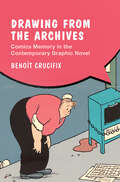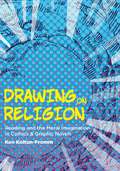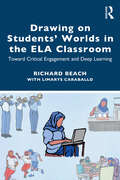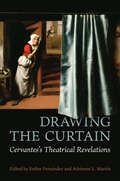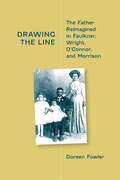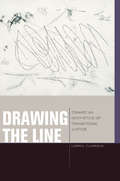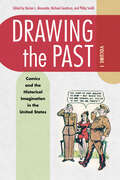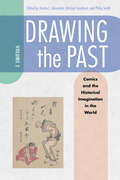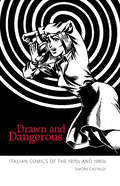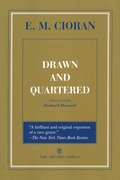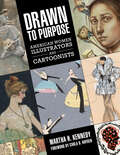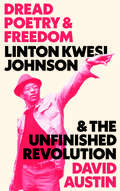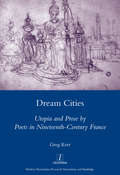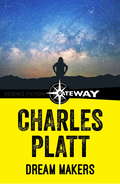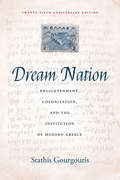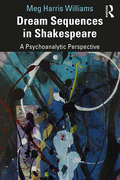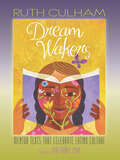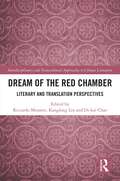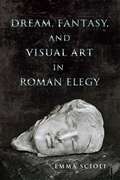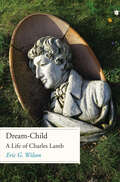- Table View
- List View
Drawing from the Archives: Comics Memory in the Contemporary Graphic Novel (Cambridge Studies in Graphic Narratives)
by Benoît CrucifixFollowing Art Spiegelman's declaration that 'the future of comics is in the past,' this book considers comics memory in the contemporary North American graphic novel. Cartoonists such as Chris Ware, Seth, Charles Burns, Daniel Clowes, and others have not only produced some of the most important graphic novels, they have also turned to the history of comics as a common visual heritage to pass on to new readers. This book is a full-length study of contemporary cartoonists when they are at work as historians: it offers a detailed description of how they draw from the archives of comics history, examining the different gestures of collecting, curating, reprinting, swiping, and undrawing that give shape to their engagement with the past. In recognizing these different acts of transmission, this book argues for a material and vernacular history of how comics are remembered, shared, and recirculated over time.
Drawing on Religion: Reading and the Moral Imagination in Comics and Graphic Novels
by Ken Koltun-FrommComics traffic in stereotypes, which can translate into real danger, as was the case when, in 2015, two Muslim gunmen opened fire at the offices of Charlie Hebdo, which had published depictions of Islam and Muhammad perceived by many to be blasphemous. As a response to that tragedy, Ken Koltun-Fromm calls for us to expand our moral imaginations through readings of graphic religious narratives.Utilizing a range of comic books and graphic novels, including R. Crumb’s Book of Genesis Illustrated, Craig Thompson’s Blankets, the Vakil brothers’ 40 Sufi Comics, and Ms. Marvel, Koltun-Fromm argues that representing religion in these formats is an ethical issue. By focusing on the representation of Christian, Jewish, Muslim, and Hindu religious traditions, the comics discussed in this book bear witness to the ethical imagination, the possibilities of traversing religious landscapes, and the problematic status of racial, classed, and gendered characterizations of religious persons. Koltun-Fromm explores what religious stereotypes do and how they function in comics in ways that might expand or diminish our imaginative worlds. The pedagogical challenge, he argues, is to linger in that space and see those worlds well, with both ethical sensitivity and moral imagination.Accessibly written and vibrantly illustrated, this book sheds new light on the ways in which comic arts depict religious faith and culture. It will appeal to students and scholars of religion, literature, and comic studies.
Drawing on Religion: Reading and the Moral Imagination in Comics and Graphic Novels
by Ken Koltun-FrommComics traffic in stereotypes, which can translate into real danger, as was the case when, in 2015, two Muslim gunmen opened fire at the offices of Charlie Hebdo, which had published depictions of Islam and Muhammad perceived by many to be blasphemous. As a response to that tragedy, Ken Koltun-Fromm calls for us to expand our moral imaginations through readings of graphic religious narratives.Utilizing a range of comic books and graphic novels, including R. Crumb’s Book of Genesis Illustrated, Craig Thompson’s Blankets, the Vakil brothers’ 40 Sufi Comics, and Ms. Marvel, Koltun-Fromm argues that representing religion in these formats is an ethical issue. By focusing on the representation of Christian, Jewish, Muslim, and Hindu religious traditions, the comics discussed in this book bear witness to the ethical imagination, the possibilities of traversing religious landscapes, and the problematic status of racial, classed, and gendered characterizations of religious persons. Koltun-Fromm explores what religious stereotypes do and how they function in comics in ways that might expand or diminish our imaginative worlds. The pedagogical challenge, he argues, is to linger in that space and see those worlds well, with both ethical sensitivity and moral imagination.Accessibly written and vibrantly illustrated, this book sheds new light on the ways in which comic arts depict religious faith and culture. It will appeal to students and scholars of religion, literature, and comic studies.
Drawing on Students’ Worlds in the ELA Classroom: Toward Critical Engagement and Deep Learning
by Richard BeachThis book approaches English instruction through the lens of “fi gured worlds,” which recognizes and spotlights how students are actively engaged in constructing their own school, peer group, extracurricular, and community worlds. Teachers’ ability not only to engage with students’ experiences and interests in and outside of school but also to build connections between students’ worlds and their teaching is essential for promoting student agency, engagement, and meaningful learning. Beach and Caraballo provide an accessible framework for working with students to use critical discourse, narratives, media, genres, and more to support their identity development through addressing topics that are meaningful for them— their families, social issues, virtual worlds, and more. Through extensive activities and examples of students writing about their participation in these worlds, this text allows educators to recognize how students’ experiences in the classroom aff ect and shape their identities and to connect such an understanding to successful classroom practice. With chapters featuring eff ective instructional activities, this book is necessary reading for ELA methods courses and for all English teachers.
Drawing the Curtain: Cervantes's Theatrical Revelations (Toronto Iberic)
by Esther Fernández Adrienne L. MartínMiguel de Cervantes’s experimentation with theatricality is frequently tied to the notion of revelation and disclosure of hidden truths. Drawing the Curtain showcases the elements of theatricality that characterize Cervantes’s prose and analyses the ways in which he uses theatricality in his own literary production. Bringing together the works of well-known scholars, who draw from a variety of disciplines and theoretical approaches, this collection demonstrates how Cervantes exploits revelation and disclosure to create dynamic dramatic moments that surprise and engage observers and readers. Hewing closely to Peter Brook’s notion of the bare or empty stage, Esther Fernández and Adrienne L. Martín argue that Cervantes’s omnipresent concern with theatricality manifests not only in his drama but also in the myriad metatheatrical instances dispersed throughout his prose works. In doing so, Drawing the Curtain sheds light on the ways in which Cervantes forces his readers to engage with themes that are central to his life and works, including love, freedom, truth, confinement, and otherness.
Drawing the Line: The Father Reimagined in Faulkner, Wright, O'Connor, and Morrison
by Doreen FowlerIn an original contribution to the psychoanalytic approach to literature, Doreen Fowler focuses on the fiction of four major American writers—William Faulkner, Richard Wright, Flannery O'Connor, and Toni Morrison—to examine the father's function as a "border figure." Although the father has most commonly been interpreted as the figure who introduces opposition and exclusion to the child, Fowler finds in these literary depictions fathers who instead support the construction of a social identity by mediating between cultural oppositions.Fowler counters the widely accepted notion that boundaries are solely sites of exclusion and offers a new theoretical model of boundary construction. She argues that boundaries are mysterious, dangerous, in-between places where a balance of sameness and difference makes differentiation possible. In the fiction of these southern writers, father figures introduce a separate cultural identity by modeling this mix of relatedness and difference. Fathers intervene in the mother-child relationship, but the father is also closely related to both mother and child. This model of boundary formation as a balance of exclusion and relatedness suggests a way to join with others in an inclusive, multicultural community and still retain ethnic, racial, and gender differences. Fowler's model for the father's mediating role in initiating gender, race, and other social differences shows not only how psychoanalytic theory can be used to interpret fiction and cultural history but also how literature and history can reshape theory.
Drawing the Line: Toward an Aesthetics of Transitional Justice (Just Ideas)
by Carrol ClarksonDrawing the Line examines the ways in which cultural, political, and legal lines are imagined, drawn, crossed, erased, and redrawn in post-apartheid South Africa—through literary texts, artworks, and other forms of cultural production. Under the rubric of a philosophy of the limit, and with reference to a range of signifying acts and events, this book asks what it takes to recalibrate a sociopolitical scene, shifting perceptions of what counts and what matters, of what can be seen and heard, of what can be valued or regarded as meaningful.The book thus argues for an aesthetics of transitional justice and makes an appeal for a postapartheid aesthetic inquiry, as opposed to simply a political or a legal one. Each chapter brings a South African artwork, text, speech, building, or social encounter into conversation with debates in critical theory and continental philosophy, asking: What challenge do these South African acts of signification and resignification pose to current literary-philosophical debates?
Drawing the Past, Volume 1: Comics and the Historical Imagination in the United States
by Dorian L. Alexander, Michael Goodrum and Philip SmithContributions by Lawrence Abrams, Dorian L. Alexander, Max Bledstein, Peter Cullen Bryan, Stephen Connor, Matthew J. Costello, Martin Flanagan, Michael Fuchs, Michael Goodrum, Bridget Keown, Kaleb Knoblach, Christina M. Knopf, Martin Lund, Jordan Newton, Stefan Rabitsch, Maryanne Rhett, and Philip SmithHistory has always been a matter of arranging evidence into a narrative, but the public debate over the meanings we attach to a given history can seem particularly acute in our current age. Like all artistic mediums, comics possess the power to mold history into shapes that serve its prospective audience and creator both. It makes sense, then, that history, no stranger to the creation of hagiographies, particularly in the service of nationalism and other political ideologies, is so easily summoned to the panelled page. Comics, like statues, museums, and other vehicles for historical narrative, make both monsters and heroes of men while fueling combative beliefs in personal versions of United States history.Drawing the Past, Volume 1: Comics and the Historical Imagination in the United States, the first book in a two-volume series, provides a map of current approaches to comics and their engagement with historical representation. The first section of the book on history and form explores the existence, shape, and influence of comics as a medium. The second section concerns the question of trauma, understood both as individual traumas that can shape the relationship between the narrator and object, and historical traumas that invite a reassessment of existing social, economic, and cultural assumptions. The final section on mythic histories delves into ways in which comics add to the mythology of the US.Together, both volumes bring together a range of different approaches to diverse material and feature remarkable scholars from all over the world.
Drawing the Past, Volume 2: Comics and the Historical Imagination in the World
by Dorian L. Alexander, Michael Goodrum and Philip SmithContributions by Dorian L. Alexander, Chris Bishop, David Budgen, Lewis Call, Lillian Céspedes González, Dominic Davies, Sean Eedy, Adam Fotos, Michael Goodrum, Simon Gough, David Hitchcock, Robert Hutton, Iain A. MacInnes, Małgorzata Olsza, Philip Smith, Edward Still, and Jing Zhang In Drawing the Past, Volume 2: Comics and the Historical Imagination in the World, contributors seek to examine the many ways in which history worldwide has been explored and (re)represented through comics and how history is a complex construction of imagination, reality, and manipulation. Through a close analysis of such works as V for Vendetta, Maus, and Persepolis, this volume contends that comics are a form of mediation between sources (both primary and secondary) and the reader. Historical comics are not drawn from memory but offer a nonliteral interpretation of an object (re)constructed in the creator’s mind. Indeed, when it comes to history, stretching the limits of the imagination only serves to aid in our understanding of the past and, through that understanding, shape ourselves and our futures. This volume, the second in a two-volume series, is divided into three sections: History and Form, Historical Trauma, and Mythic Histories. The first section considers the relationship between history and the comic book form. The second section engages academic scholarship on comics that has recurring interest in the representation of war and trauma. The final section looks at mythic histories that consciously play with events that did not occur but nonetheless inflect our understanding of history. Contributors to the volume also explore questions of diversity and relationality, addressing differences between nations and the cultural, historical, and economic threads that bind them together, however loosely, and however much those bonds might chafe.Together, both volumes bring together a range of different approaches to diverse material and feature remarkable scholars from all over the world.
Drawn and Dangerous: Italian Comics of the 1970s and 1980s
by Simone CastaldiExploring an overlooked era of Italian history roiled by domestic terrorism, political assassination, and student protests, Drawn and Dangerous: Italian Comics of the 1970s and 1980s shines a new light on what was a dark decade, but an unexpectedly prolific and innovative period among artists of comics intended for adults. Blurring the lines between high art and popular consumption, artists of the Italian comics scene went beyond passively documenting history and began actively shaping it through the creation of fictional worlds where history, cultural data, and pop-realism interacted freely. Featuring brutal Stalinist supermen, gay space travelers, suburban juvenile delinquents, and student activists turned tech-savvy saboteurs, these comics ultimately revealed a volatile era more precisely than any mainstream press. Italian comics developed a journalistic, ideology-free, and sardonic approach in representing the key events of their times. Drawn and Dangerous makes a case for the importance of the adult comics of the '70s and '80s. During those years, comic production reached its peak in maturity, complexity, and wealth of cultural references. The comic artists' analyses of the political and religious landscape reveal fresh perspectives on a transformative period in Italian history.
Drawn and Quartered
by E. M. Cioran Eugene ThackerIn this collection of aphorisms and short essays, E.M. Cioran sets about the task of peeling off the layers of false realities with which society masks the truth. For him, real hope lies in this task, and thus, while he perceives the world darkly, he refuses to give in to despair. He hits upon this ultimate truth by developing his notion of human history and events as "a procession of delusions," striking out at the so-called "Fallacies of Hope." By examining the relationship between truth and action and between absolutes, unknowables, and frauds, Cioran comes out, for once, in favor of being.
Drawn from the Ground
by Jennifer GreenSand stories from Central Australia are a traditional form of Aboriginal women's verbal art that incorporates speech, song, sign, gesture and drawing. Small leaves and other objects may be used to represent story characters. This detailed study of Arandic sand stories takes a multimodal approach to the analysis of the stories and shows how the expressive elements used in the stories are orchestrated together. This richly illustrated volume is essential reading for anyone interested in language and communication. It adds to the growing recognition that language encompasses much more than speech alone, and shows how important it is to consider the different semiotic resources a culture brings to its communicative tasks as an integrated whole rather than in isolation.
Drawn to Purpose: American Women Illustrators and Cartoonists
by Martha H. KennedyWinner of the 2019 Eisner Award for the Best Comics-Related BookPublished in partnership with the Library of Congress, Drawn to Purpose: American Women Illustrators and Cartoonists presents an overarching survey of women in American illustration, from the late nineteenth into the twenty-first century. Martha H. Kennedy brings special attention to forms that have heretofore received scant notice—cover designs, editorial illustrations, and political cartoons—and reveals the contributions of acclaimed cartoonists and illustrators, along with many whose work has been overlooked. Featuring over 250 color illustrations, including eye-catching original art from the collections of the Library of Congress, Drawn to Purpose provides insight into the personal and professional experiences of eighty women who created these works. Included are artists Roz Chast, Lynda Barry, Lynn Johnston, and Jillian Tamaki. The artists' stories, shaped by their access to artistic training, the impact of marriage and children on careers, and experiences of gender bias in the marketplace, serve as vivid reminders of social change during a period in which the roles and interests of women broadened from the private to the public sphere. The vast, often neglected, body of artistic achievement by women remains an important part of our visual culture. The lives and work of the women responsible for it merit much further attention than they have received thus far. For readers who care about cartooning and illustration, Drawn to Purpose provides valuable insight into this rich heritage.
Dread Poetry and Freedom: Linton Kwesi Johnson and the Unfinished Revolution
by David AustinSince the 1970s, poet Linton Kwesi Johnson has been putting pen to paper to refute W.H. Auden’s claim that “poetry makes nothing happen.” For Johnson, only the second living poet to have been published in the Penguin Modern Classics series, writing has always been “a political act” and poetry “a cultural weapon.” In Dread Poetry and Freedom David Austin explores the themes of poetry, political consciousness, and social transformation through the prism of Johnson’s work. Drawing from the Bible, reggae and Rastafari, and surrealism, socialism, and feminism, and in dialogue with Aimé Césaire and Frantz Fanon, C.L.R. James and Walter Rodney, W.E.B. Du Bois and the poetry of d’bi young anitafrika, Johnson’s work becomes a crucial point of reflection on the meaning of freedom in this masterful and rich study.
Dream Cities: Utopia and Prose by Poets in Nineteenth-century France
by Greg Kerr"Against a backdrop of dizzying urbanization, French utopian thinkers of the nineteenth century set out to explore the transformative possibilities of the modern metropolis. Linking literary analyses with diverse strands of cultural and intellectual history, this study considers how the utopian vision of the city in turn came to impinge on prose writing by poets: in Saint-Simonian literature, and in texts by Theophile Gautier, Charles Baudelaire and Arthur Rimbaud. At points steeped in the hyperbolic rhetoric of utopian projects, these texts nonetheless wear away at the internal coherence of that rhetoric and the idealizing meanings it supports. What emerges from Greg Kerr's analysis is a hitherto unfamiliar dimension of these writings, revealing the alertness of some of the greatest exponents of nineteenth-century poetry to the dynamic possibilities of utopian writing, and suggesting new ways to understand the evolution of poetic discourse across the century. Greg Kerr is Lecturer in French at the University of Lancaster."
Dream Makers
by Charles PlattWhen Charles Platt set out to answer the question, "Who writes science fiction?" he interviewed almost all the writers who molded the field during the 1960s, 1970s, and 1980s. The profiles that Platt wrote have become a definitive source of information about the lives and careers of Isaac Asimov, Jerry Pournelle, Frank Herbert, Frederik Pohl, and dozens more.Originally published in two volumes, the profiles collected here have been specially updated with afterwords written in 2017."There has never been a better book about science fiction; it is doubtful that there has ever veen a better book about writing of any kind." -The Cleveland Press."A book of sharp, insightful, beautifully written essays . . . . This is quite probably the finest book of its type yet to appear." -Publishers Weekly."A magnificent achievement, exemplary in its insights, its structure, its editorial restraint and perspective . . . a monumental book." -Robert Silverberg."Platt held me spellbound for hours. . . . These are some of the best [interviews] I've ever seen." -Analog magazine."A superb piece of work . . . full of color and warm empathy, it makes for charming reading." -Alfred Bester.
Dream Makers: The Uncommon People Who Write Science Fiction
by Charles PlattCharles Platt spent two years travelling America and England on a personal odyssey to interview thirty top writers in the field of science fiction. The aim was to have the authors tell readers how they created their most famous books, and answer some persistent questions readers might have: are these guys normal, wife-kids-mortgage-and a car in the garage? Each chapter focuses on a different author, and they are in geographical order, starting from the east coast of the US and moving westward.
Dream Nation: Enlightenment, Colonization and the Institution of Modern Greece, Twenty-Fifth Anniversary Edition
by Stathis GourgourisAgainst the backdrop of ever-increasing nationalist violence during the last decade of the twentieth century, this book challenges standard analyses of nation formation by elaborating on the nation's dream-like hold over the modern social imagination. Stathis Gourgouris argues that the national fantasy lies at the core of the Enlightenment imaginary, embodying its central paradox: the intertwining of anthropological universality with the primacy of a cultural ideal. Crucial to the operation of this paradox and fundamental in its ambiguity is the figure of Greece, the universal alibi and cultural predicate behind national-cultural consolidation throughout colonialist Europe. The largely unpredictable institution of a modern Greek nation in 1830 undoes the interweaving of Enlightenment and Philhellenism, whose centrifugal strands continue to unravel the certainty of European history, down to the internal predicaments of the European Union or the tragedy of the Balkan conflicts. This 25th Anniversary edition of the book includes a new preface by the author in which he situates the book's original insights in retrospect against the newer developments in the social and political conditions of a now globalized world: the neocolonial resurgence of nationalism and racism, the failure of social democratic institutions, the crisis of sovereignty and citizenship, and the brutal conditions of stateless peoples.
Dream Sequences in Shakespeare: A Psychoanalytic Perspective
by Meg Harris WilliamsThis book takes a new approach to Shakespeare’s plays, exploring them as dream-thought in the modern psychoanalytic sense of unconscious thinking. Through his commitment to poetic language, Shakespeare offers images and dramatic sequences that illustrate fundamental developmental conflicts, the solutions for which are not preconceived but evolve through the process of dramatisation. In this volume, Meg Harris Williams explores the fundamental distinction between the surface meanings of plot or argument and the deep grammar of dreamlife, applied not only to those plays known as ‘dream-plays’ but also to critical sequences throughout Shakespeare’s oeuvre. Through a post-Kleinian model based on the thinking of Bion, Meltzer, and Money-Kyrle, this book sheds new light on both Shakespeare’s own relation to the play and on the identificatory processes of the playwright, reader, or audience. Dream Sequences in Shakespeare is important reading for psychoanalysts, playwrights, and students.
Dream Wakers: Mentor Texts That Celebrate Latino Culture
by Ruth CulhamThere is power that resides in outstanding culturally diverse literature'sa power that has the potential to engage students in reading and teach them about the art and craft of writing. 'sRuth Culham We dream of a time when all students will be confident, capable readers and writers. When we teach students to read as writers using mentor texts, we awaken that dream and make it real. Imagine the power of providing students with books that show them their faces, their culture, their lives on every page. And imagine how every classroom's collection of mentor texts can grow by adding books that celebrate diversity. In Dream Wakers: Mentor Texts That Celebrate Latino Culture, Ruth Culham focuses her love of children's literature'sand her decades of work developing the traits of writing'son books that celebrate Latino life and culture. She provides a wide variety of ideas to teach writing using some of the richest and most beautiful children's books available. Dream Wakers gives you: • An annotated list of more than 120 books with do-it-today lesson ideas for teaching the traits of writing'sIdeas, Organization, Voice, Word Choice, Sentence Fluency, and Conventions. More than half of the books listed are bilingual or offer English and/or Spanish editions. • Eleven original, insightful essays by renowned children's authors of some of the featured books • A handy reference chart that helps teachers locate books quickly by trait, genre, language, and author/publisher information. Ruth encourages all of us to make sure students of all backgrounds have access to high-quality, culturally diverse texts and recognize the difference those texts will make in their reading lives, as well as in their perception of themselves as a thinkers, learners, and citizens.
Dream of the Dead
by Marie SethJenny and her father go to remote Scotland for the summer. Jenny's friend Diana comes for a visit. But it seems the house is haunted and Diana is drawn into the past.
Dream of the Red Chamber: Literary and Translation Perspectives (Interdisciplinary and Transcultural Approaches to Chinese Literature)
by Kanglong Liu Riccardo Moratto Di-Kai ChaoThis edited volume contains an excellent collection of contributions and presents various informative topics under the central theme: literary and translation approaches to China’s greatest classical novel Hongloumeng. Acclaimed as one of the Four Great Classical Novels of Chinese literature, Hongloumeng (known in English as The Dream of the Red Chamber or The Story of the Stone) epitomizes 18th century Chinese social and cultural life. Owing to its kaleidoscopic description of Chinese life and culture, the novel has also exerted a significant impact on world literature. Its various translations, either full-length or abridged, have been widely read by an international audience. The contributors to this volume provide a renewed perspective into Hongloumeng studies by bringing together scholarship in the fields of literary and translation studies. Specifically, the use of corpora in the framework of digital humanities in a number of chapters helps re-address many issues of the novel and its translations, from an innovative angle. The book is an insightful resource for both scholars of Chinese literature and for linguists with a focus on translation studies.
Dream, Fantasy, and Visual Art in Roman Elegy
by Emma ScioliThe elegists, ancient Rome’s most introspective poets, filled their works with vivid, first-person accounts of dreams. Dream, Fantasy, and Visual Art in Roman Elegy examines these varied and visually striking textual dreamscapes, arguing that the poets exploited dynamics of visual representation to allow readers to share in the intensely personal experience of dreaming. By treating dreams as a mode for viewing, an analogy suggested by diverse ancient authors, Emma Scioli extracts new information from the poetry of Propertius, Tibullus, and Ovid about the Roman concept of "seeing” dreams. Through comparison with other visual modes of description, such as ekphrasis and simile, as well as with related types of visual experience, such as fantasy and voyeurism, Scioli demonstrates similarities between artist, dreamer, and poet as creators, identifying the dreamer as a particular type of both viewer and narrator.
Dream-Child: A Life of Charles Lamb
by Eric G. WilsonAn in-depth look into the life of Romantic essayist Charles Lamb and the legacy of his work A pioneer of urban Romanticism, essayist Charles Lamb (1775–1834) found inspiration in London’s markets, theaters, prostitutes, and bookshops. He prized the city’s literary scene, too, where he was a star wit. He counted among his admirers Mary Shelley, William Wordsworth, and Samuel Taylor Coleridge. His friends valued in his conversation what distinguished his writing style: a highly original blend of irony, whimsy, and melancholy. Eric G. Wilson captures Lamb’s strange charm in this meticulously researched and engagingly written biography. He demonstrates how Lamb’s humor helped him cope with a life‑defining tragedy: in a fit of madness, his sister Mary murdered their mother. Arranging to care for her himself, Lamb saved her from the gallows. Delightful when sane, Mary became Charles’s muse, and she collaborated with him on children’s books. In exploring Mary’s presence in Charles’s darkly comical essays, Wilson also shows how Lamb reverberates in today’s experimental literature.
Dreamer of Dune: The Biography of Frank Herbert
by Brian HerbertA biography of Frank Herbert, author of 'Dune', by his son.
